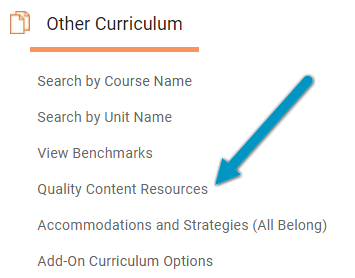Curriculum Trak has added a Quality Content Resources area to provide additional collaboration opportunities to support your curriculum planning and instructional efforts. Educators are always looking for ways to gather and share tips, tricks, and helpful resources and practices with their network. That practice is one of the foundational purposes of curriculum mapping in the first place and why Curriculum Trak has supported these collaborative practices in a variety of ways. Our hope is that this new Quality Content Resources area will provide yet another avenue of meaningful collaboration and networking.

In the Other Curriculum Area dropdown menu within your account you will now see the Quality Content Resources option. Clicking into this area will take you to an annotated bibliography of web-based resources. These resources come to you as the result of a recommendation by a member of the network of Curriculum Trak users. They are related, directly or indirectly, to the practices of curriculum mapping and deemed to have value to a broad swath of Curriculum Trak schools with which we work. While some of the linked websites contain additional opportunities to pay for products or services, they are included here because the majority of the information they provide is free to use or falls within a basic application of fair-use laws. In other words, these resources are shared because they are perceived to bring value to your planning and instructional efforts. The brief description included with each resource seeks to paint a picture for any user who might be interested in exploring it further.
You will see that this list of resources is still relatively short.The vision we have for this area is that it would grow over time with input from people like you. There is a wealth of information that could have been included here, but our goal is to evaluate the possible resources and curate the most relevant list possible with an eye toward the following criteria:
- Related to Curriculum Mapping and Planning Practices: The resource must be useful to curriculum and instructional planning rather than useful in content delivery or for student use. They are teacher-focused, rather than student-focused. This separates the resources listed from resources that could be used as part of instruction and helps us limit the overwhelming size this resource could become.
- Relevant to the CT Network: The resource must be relevant and useful to a wide-base of faith-based and independent schools. Curriculum Trak focuses on schools in these categories and makes many support and training decisions based on our understanding of this network. The resources do not need to originate from or specifically targeted to these circles, but they should be deemed useful by schools who fall into these areas.
- Widely Respected: The resource must be proven and fall into the categories of best or recommended practices. While innovative and experimental practices play a valuable role in the art and practice of teaching, the Quality Content area will avoid unproven and untested resources until they become more widely accepted.
- Recommended by a CT User: The resource must be nominated by someone within the CT Network, a current Curriculum Trak user. We do not accept nominations from publishers or content providers. We recognize that a platform such as this could easily become a marketing or sales platform. One of the ways we will seek to avoid that is by requiring nominations from our verified users.
- Readily Available for Use: We are not seeking to link to content that exists behind paywalls or requiring any payment. We recognize that many consultants and content publishers provide complimentary resources as a way to promote their additional paid products and services. So, websites with links to these additional options will not be avoided, but inclusion in the Quality Content area is based solely on the free or complimentary resources provided only if those are deemed robust enough for consideration and fall within the other criteria outlined here.
- Recommended, Not Endorsed: We like to draw a distinction between our efforts to recommend resources and a perceived endorsement of the resource or related products or services. Ultimately, we encourage and seek to empower each school and each user to evaluate these resources to best meet your needs and practices.
We do want this list of resources to grow intentionally and meaningfully over time. So, we invite you to consider which of your favorite resources might fall loosely into the criteria above and submit them to support@curriculumtrak.com for consideration. Chances are, if you have found something to be helpful in your process, others will find it helpful as well. We look forward to expanding this area into a robust and useful resource for every Curriculum Trak school.
We also invite you to explore the resources currently available and check back periodically to find recent additions. Consider how the resources provided can support the current or future mapping efforts of your instructional team. Every user has access to this area regardless of permission level.



